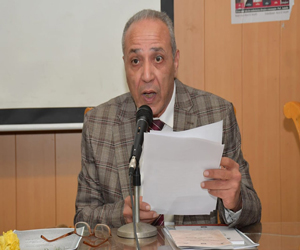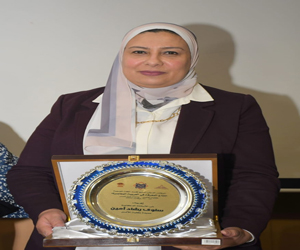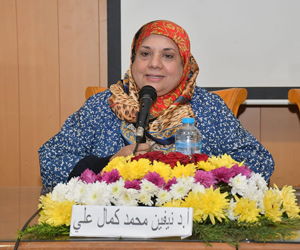The Department of Arabic Language at the Faculty of Al-Alsun is organizing its fourth international conference entitled Knowledge Production in Contemporary Arabic
The Department of Arabic Language at the Faculty of Al-Alsun, Ain Shams University, organized the activities of the fourth international conference entitled "Production of Knowledge in Contemporary Arabic" during the period from November 28 to 30, under the auspices of Prof. Mahmoud El-Meteini, President of the University, Prof. Salwa Rashad, Dean of the Faculty, Prof. Nasser Abdel-Aal, Vice Dean for Education and Student Affairs, and the supervision of Prof. Omaima Khashba, Head of the Arabic Language Department, Prof. Dr.. Majid Al-Saidi, professor of Arabic language and rapporteur of the conference.
During her inaugural speech, Prof. Salwa Rashad, Dean of the Faculty of Al-Alsun at Ain Shams University, said that the conference aims to highlight the role of the contemporary Arabic language in the knowledge society in terms of its ability to become a vessel for creativity and innovation, while identifying what could represent challenges to the Arabic language in light of the rapid informational and knowledge transformations that society is witnessing. It crosses distances and crosses borders.
In this context, the following areas of knowledge are highlighted: literature theory, critical theory, comparative literature theory in contemporary Arabic, translation theory in contemporary Arabic by presenting translation issues and knowledge fields, and the size of the Arab contribution to the issue of translation, while monitoring inter-studies in contemporary Arabic between Literature, language, translation, natural and social sciences, and audio-visual arts. The conference also presents issues of teaching Arabic to non-native speakers and the strategy used in developing curricula and courses.
 |
 |
 |
||
While A. Dr.. Maged Al-Saedy, rapporteur of the conference, that the conference seeks to present new studies and research on a sound methodological basis, with the aim of exchanging scientific experiences and spreading awareness of issues and topics related to cultural identity and intellectual independence; Achieving correct cognitive communication between Arab culture and the cultures of the world.
Prof. Naem Amin Tolba, director of the opening session, stated that the concept of this conference stems from the fact that language is the incubator for the culture and knowledge of peoples - which is accumulated through societal knowledge, which ensures the continuity, development and progress of societies, and society cannot exist without the availability of a tool for social communication, and for the transmission and preservation of heritage. Through time, to hone skills and knowledge through education, and to build a social identity, and that tool is nothing but the language that occupies its place in all human societies until it has become present in any talk about the change of society and its transition from one state to another.
Then he gave a speech to the Egyptian researchers Dr. Abdel-Rahman Abdel-Salam, Professor at the Department of Arabic Language, also gave a speech to Arab researchers Dr. Mohamed Othmani from the University of Boumerdes in Algeria, and the speech of foreign researchers was delivered by Dr. John Darwell, former director of the Oriental Institute of the Dominican Fathers in Cairo, Dr. Hanan Mounib, the word of the Alsunian, and Dr. Alaa Abdel Hadi, Secretary General of the Union of Arab Writers, the word of the Arab writers.
At the end of the opening session, Prof. Dr. Salwa Rashad, Dean of the Faculty of Al-Alsun, was honored, and Prof. Dr. Salah Fadl, President of the Arabic Language Academy in Cairo, was also honored. The shield of the conference was received on his behalf by Dr. Saeed Al-Wakeel, Professor at the Faculty of Arts.
It is worth noting that the conference continues until the 30th of November, and includes twelve scientific sessions, during which researchers discuss topical issues facing the Arabic language in light of the successive global developments.


.svg)




